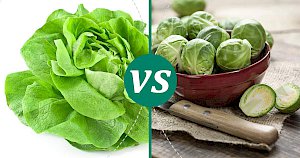Brussels Sprouts vs Lettuce: Nutrition & Calories Compare


Brussels sprouts vs Lettuce
Nutrition Facts
Serving size:
change
5g10g15g20g30g40g50g60g80g100g120g140g160g180g200g220g250g300g350g400g450g500g600g700g800g900g1000g
1oz2oz3oz4oz5oz6oz7oz8oz10oz12oz15oz20oz25oz30oz35oz40oz50oz
Amount Per Serving:
Serving size:
change
5g10g15g20g30g40g50g60g80g100g120g140g160g180g200g220g250g300g350g400g450g500g600g700g800g900g1000g
1oz2oz3oz4oz5oz6oz7oz8oz10oz12oz15oz20oz25oz30oz35oz40oz50oz
Amount Per Serving:
Brussels Sprouts vs Lettuce 100g Compare
| per 100g | Brussels sprouts | Lettuce |
|---|---|---|
| Calories | 43 | 15 |
| Carbohydrates | 8.95 g | 2.87 g |
| Fat | 0.3 g | 0.15 g |
| Dietary fiber | 3.8 g | 1.3 g |
| Protein | 3.38 g | 1.36 g |
| Calcium | 42 mg | 36 mg |
| Iron | 1.4 mg | 0.86 mg |
| Magnessium | 23 mg | 13 mg |
| Phosphorus | 69 mg | 29 mg |
| Potassium | 389 mg | 194 mg |
| Sodium | 25 mg | 28 mg |
| Zink | 0.42 mg | 0.18 mg |
| Vitaminium A | 754 µg | 7405 µg |
| Vitaminium B1 (Thiamine) | 0.139 mg | 0.07 mg |
| Vitaminium B2 (riboflavin) | 0.9 mg | 0.08 mg |
| Vitaminium B3 (Niacin) | 0.745 mg | 0.375 mg |
| Vitaminium B5 | 0.309 mg | 0.134 mg |
| Vitaminium B6 | 0.219 mg | 0.09 mg |
| Vitaminium B9 (Folic acid) | 61 mg | 38 mg |
| Vitaminium C | 85 mg | 9.2 mg |
| Vitaminium K | 177 µg | 126.3 µg |
| Beta karoten | 450 mg | 4443 mg |
When it comes to choosing the healthiest greens for your dinner plate, both Brussels sprouts and lettuce offer a range of benefits that can contribute to a balanced diet. However, understanding the nutritional nuances between these two vegetables can help you make an informed decision based on your dietary needs. Let's delve into some fascinating facts about Brussels sprouts and lettuce before comparing their nutritional profiles.
Interesting Facts about Brussels Sprouts
Brussels sprouts, belonging to the Gemmifera Group of cabbages, are named after the Belgian city of Brussels, which hints at their European heritage. These mini cabbages are not only packed with nutrients but also have a unique, slightly bitter flavor that becomes sweeter when cooked properly. Brussels sprouts are particularly known for their high vitamin C and K content, making them excellent for bone health and immune support.
Interesting Facts about Lettuce
Lettuce, on the other hand, is a leafy green vegetable known for its role in salads worldwide. There are several varieties of lettuce, each with its own distinct taste and texture, from the crisp and watery iceberg to the soft and buttery Boston. Lettuce is highly appreciated for its hydrating properties, thanks to its high water content, and it's also a good source of vitamin A and K.
Brussels Sprouts vs Lettuce: Nutritional Breakdown
When comparing Brussels sprouts vs Lettuce calories and overall nutrition, it's clear that both vegetables have their unique strengths. Here's a closer look at how they stack up against each other:
- Calories: Brussels sprouts contain 43 calories per 100 grams, whereas lettuce contains only 15 calories, making lettuce a better option for calorie-conscious individuals.
- Carbohydrates and Fiber: With 8.95 grams of carbs and 3.8 grams of fiber, Brussels sprouts are higher in both than lettuce, which has 2.87 grams of carbs and 1.3 grams of fiber. This makes Brussels sprouts a good choice for those looking to increase their fiber intake.
- Protein: Brussels sprouts also lead with 3.38 grams of protein compared to lettuce's 1.36 grams, offering a more protein-rich option.
- Vitamins and Minerals: Brussels sprouts boast higher levels of vitamins C and K, iron, magnesium, phosphorus, and potassium. Lettuce, however, is not far behind and surpasses Brussels sprouts with a significantly higher vitamin A content, thanks to its beta carotene.
In the Lettuce vs Brussels sprouts Nutrition face-off, it's evident that both vegetables are nutritional powerhouses in their own right. Your choice between the two might come down to specific dietary needs or preferences. For instance, if you're aiming to increase your fiber and protein intake, Brussels sprouts might be the way to go. On the other hand, if you're looking for a low-calorie option rich in vitamin A, lettuce could be more suitable.
Conclusion
In conclusion, both Brussels sprouts and lettuce offer valuable nutrients that can contribute to a healthy diet. Whether you prefer the hearty texture and rich flavor of Brussels sprouts or the crisp freshness of lettuce, incorporating these vegetables into your meals can boost your intake of essential vitamins and minerals. Remember, the key to a balanced diet is variety, so why not enjoy both?
Brussels sprouts 100g
43kcalCalories source
- 69% CARBS.
- 26% PROTEIN
- 5% FAT
Lettuce 100g
15kcalCalories source
- 63% CARBS
- 30% PROTEIN
- 7% FAT
Compares of Brussels sprouts
- Brussels Sprouts vs Artichoke
- Brussels Sprouts vs Arugula
- Brussels Sprouts vs Asparagus
- Brussels Sprouts vs Beetroot
- Brussels Sprouts vs Pepper
- Brussels Sprouts vs Bitter Melon
- see all compares of Brussels sprouts
Compares of lettuce
Read also:
- Calories from Brussels sprouts
- Calories of Butternut squash
- Calories in Cabbage
- Carrot calories per 100g
- Cassava protein per 100g
- How many calories does cauliflower have?
- Calories in a half of cucumber
- Calories in whole cucumber
- Calories for one, two or more cucumbers
- Calories in slice of cucumber
- How much protein in eggplant?
Marcin Piotrowicz
calories-info.com creator
Healthy diet and healthy lifestyle promoter
Add comment